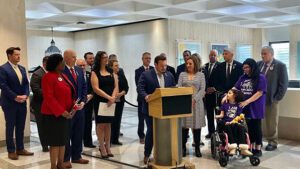In a significant step toward advancing medical research and support for rare diseases, the Florida Legislature passed a critical program introduced through SB 1582 by Pinellas Representative Adam Anderson.
The Andrew John Anderson Pediatric Rare Disease Grant Program is now on its way to Governor Ron DeSantis’s desk for final approval, marking a pivotal moment in the state’s pledge to address the needs of individuals suffering from rare diseases.
 With over 7,000 known rare diseases affecting an estimated 350 million people globally, including 30 million Americans, the urgency of dedicated research and resources has never been greater. Florida’s proactive effort strives to bridge the gap in genetic research and gene therapy, positioning the state as a leader in the field.
With over 7,000 known rare diseases affecting an estimated 350 million people globally, including 30 million Americans, the urgency of dedicated research and resources has never been greater. Florida’s proactive effort strives to bridge the gap in genetic research and gene therapy, positioning the state as a leader in the field.
Republican Representative Adam Anderson expressed his enthusiasm for the bill’s passage, saying: “Today marks a significant victory for families and individuals impacted by rare diseases not only in Florida but around the world. The establishment of the Andrew John Anderson Pediatric Rare Disease Grant Program conveys our promise to push the boundaries of science and medicine. We are determined to make Florida a beacon of hope and a leader in the quest for cures and effective treatments for rare diseases.”
The program will facilitate scientific and clinical research grants, focusing on pediatric rare diseases. It aims to foster collaboration among universities, research institutes, and community practitioners, ensuring a comprehensive approach to tackling this pressing health issue.
“Tay-Sachs disease is one example of an ultra-rare condition that is one hundred percent fatal in children,” said Rick Karl, President of the Cure Tay-Sachs Foundation, a patient advocacy group. “To date, there has been no effective treatment. This comprehensive effort by Rep. Anderson and the Florida Legislature offers hope where there has been none before.”
As the bill awaits Governor DeSantis’s signature, the Florida Department of Health prepares to implement a competitive, peer-reviewed process to award grants, emphasizing the collaborative effort across state agencies, academic institutions, and the healthcare community.
This legislation underscores Florida’s pioneering role in genetic research and offers hope to millions affected by rare diseases, promising a future where rare does not mean forgotten.


